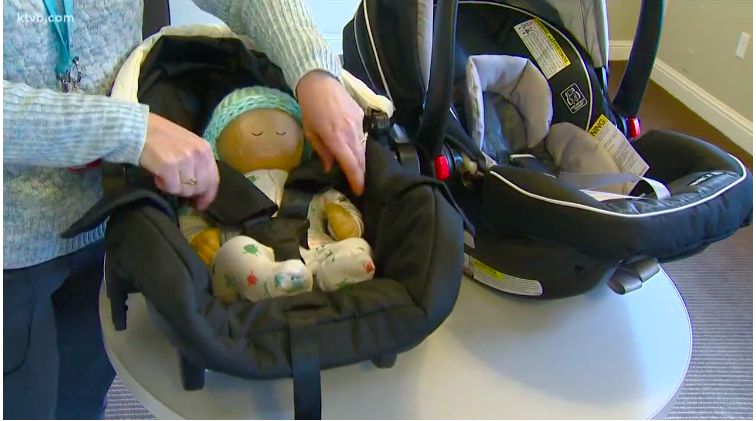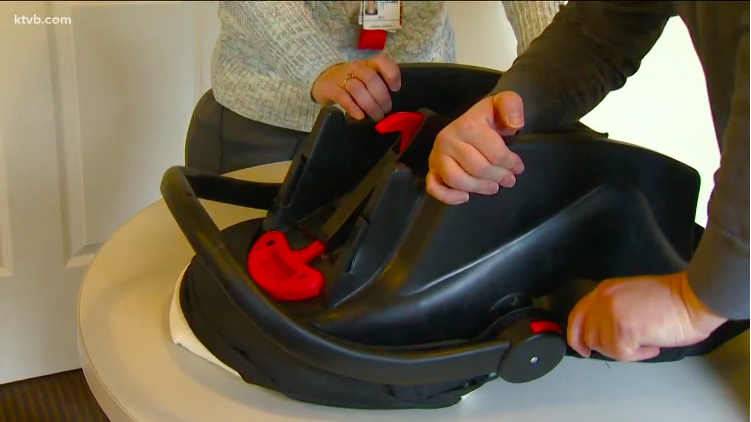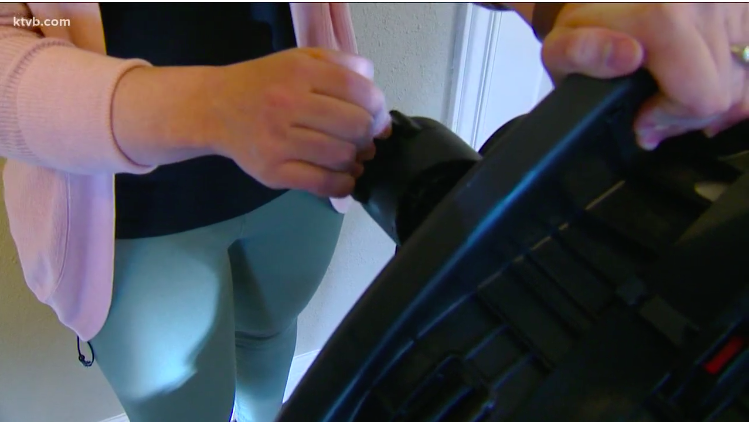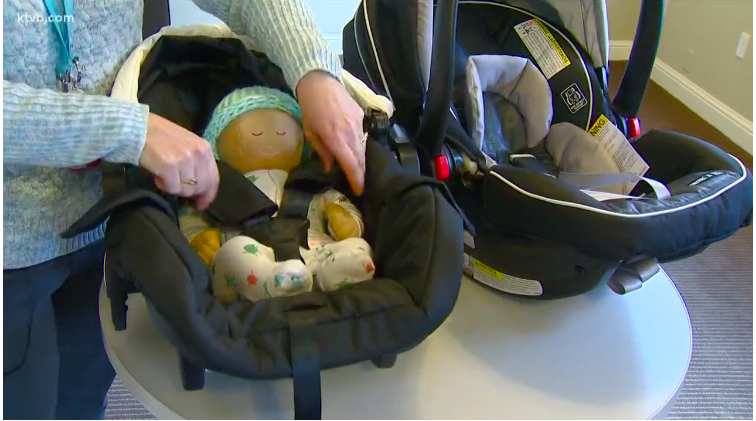
A hospital in Boise, Idaho, is alerting parents to a scary new trend that can fool almost anyone if you aren't careful. Officials at St. Luke's Children's Hospital said that they've recently seen two knock-off car seats seats in the last week, which is alarming because the seats are being labeled as name brand but actually made from cheap materials and aren't regulated. Often these car seats are being bought online, where it's harder to trace the manufacturer and make sure that the product is legitimate. Now, car seat technicians from St. Luke's are speaking out about their alarming find in hopes that they can educate parents on these knock-off seats before they hit "place order."
The car seat technicians are speaking out about the counterfeits after they found not one but two fake car seats parents were using -- and had no idea weren't legitimate.

Car seat technician Brittany Joplin spoke with reporters and warned them on Wednesday about the fake safety seats. Joplin is a part of St. Luke’s Pediatric Education and Prevention Programs, which assists new parents with learning the proper way to install and secure their child into the safety seat. She told KTVB 7 that although her hospital has heard of parents receiving fake car seats from online vendors, it was only recently that they experienced firsthand how common the problem is.
“It’s pretty terrifying," Joplin said. "There's no way a child would survive a crash in a seat like this."
Joplin explained that she only knew that one of the seats was a phony when she examined it and realized it was made from plastic.

As she continued to share, one of the fake car seats was discovered during a routine car seat check before discharging a new mother from the hospital with her newborn. The seat was ordered from Amazon as a gift from another family member, and the mother had no idea that it wasn't the real deal, according to Joplin.
But as Joplin examined the seat, she noticed that it didn't have any of the warning or safety stickers a normal car seat would have, and as she handled it, she could tell this product wasn't safe or legal in the United States.
“All of the seat parts are made of plastic," she explained as she demonstrated the faulty product. "You can see here the harness doesn't even fit our training baby here properly — the straps come out from way above its shoulders. “There's no chest clip, which is an item on all car seats in the United States."
Joplin also pointed out that the harness adjuster at the bottom of the counterfeit seat is situated at the bottom of the seat using a loose piece of metal, which would never pass US federal safety standards.
The car seat technician also demonstrated how malleable the fake seat was and was able to bend the plastic almost completely in half. “This is the piece meant to hook into the child safety base," she said as she grabbed hold to a part of the seat along its side. "You can see it bend here to where it almost snaps with not much pressure. I can also squeeze the thin plastic to where it looks like it can easily snap or break under even the lightest crash force." Which obviously would mean that in the event of a crash, such a fragile material would almost certainly do little to protect your child from impact.
For parents who want to purchase their car seat online, Joplin gave some tips and tricks to be able to identify a real car seat.

The technician showed both a fake seat and a real one side by side and explained the identifying factors that would help parents know that they had a real car seat.
Pointing toward the real seat, Joplin explained that “This one you see it has an owners’ manual and this card here attached to the harness. This is how it should come out of the box so you know it’s real.”
The fake car seat didn't come with a manual or registration card. And importantly, a real car seat will have warning labels or stickers on the seat, which lets consumers know when the seat was manufactured.
On the fake seat there is only one label that Joplin pointed out and made no sense: "Warning: Please use safety belts immediately after your baby can sit by himself.”
The safety technician also pointed out that real car seats have chest straps not straps that fasten to the base, and that harness components are usually made out of sturdy metal. “These pieces are made of metal and not plastic. It’s quite sturdy, I can’t pinch it or even attempt to break it,” she added as she gestured to the real seat.
In the second case of finding a phony seat, Joplin said the mother had brought her seat into a free car seat check event at St. Luke's Meridian Hospital, wanting to make sure she understood how to properly install and use her new seat. But she had unknowingly had a knock-off car seat, which had no stickers, was made from plastic, had no chest clip, and was identified as a fake.
The tech hopes that her tips make it to new parents and help them make sure they purchase a legitimate seat -- especially if they do their shopping on Amazon.
Another technician at St. Luke's, Jen Ellis, told reporters she had heard of an instance in Tri Cities, Washington, were a mother bought a fake seat that was written in Chinese on every label. That should be a parent's first tip-off that there was a problem.
“If the English used to explain the car seat or any features is jumbled or doesn't use proper grammar, it’s another big red flag that it’s likely not a legitimate car seat,” Joplin added.
It might be hard for parents who want to shop on an online marketplace such as Amazon to be able to tell what's real from what's fake; scammers often will use a photo of the real product as way to sell their counterfeit one. The women advise parents to be wary of third-party vendors, review the ratings and verified user comments, and prioritize products sold by Amazon or shipped from them.
But unfortunately for all bargain hunters out there, the ladies warn that if a seat is advertised as part of a “buy one, get one free” or any other deal, it's most likely fake. They also advise against purchasing used car seats because you can't verify if they've been in an accident before you purchase it.
“We never suggest purchasing seats off Craigslist or Facebook Marketplace because we just don't know if that seat is going to be safe or used," Joplin explained. "We don't know if it’s been cleaned and cared for properly, we don't know if it's been in a crash, we don't know if it’s damaged in any way."
And Ellis said she believes families can tell when they're dealing with a fake product. "If they’re questioning it at all it's probably not right and they should probably get it checked out," she said.
In the end, it's best to go into an established retailer and make your car seat purchase there. And if you're still unsure whether your car seat is counterfeit or not, there are several organizations that provide education and safety checks such as the Safe Kids Coalition that will perform a check near you.
“The biggest thing that made me upset was thinking of these companies, these businesses profiting off families just trying to keep their children safe,” Joplin said.
And Ellis was equally concerned that parents often don't realize that they're dealing with a fake product. “It scares me. It scares me for the lives of little children that they have no idea and these are life-saving devices and if they need to work that one time, you need it to work 100 percent,” Ellis said. “I’m concerned these are out in the community. These are only two that we've seen. How many more of them are there we have not seen and gotten our hands on?"




